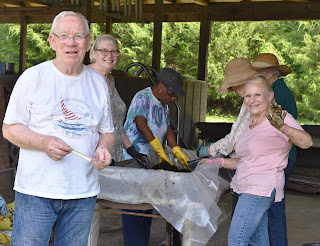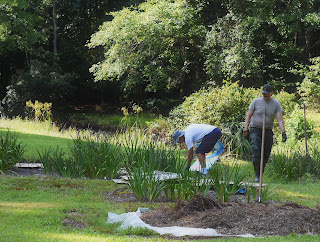How Do You Grow the Perfect Japanese Iris and the Annual Rhizome Rodeo in Sumter, SC ?!
The Sumter Master Gardeners have already begun digging in –
literally, in preparation for Swan Lake and Iris Gardens’ annual Iris Festival
Memorial Day weekend 2022.
When Sumter Master Gardener, Sheryn LaVanish told me Tuesday
afternoon that she would be going to their annual iris dig early the next morning, I knew I had to be there to learn more about the
iris I want to add to my pollinator bed. I quickly threw some things in my car and hit
the road to watch these dedicated volunteers
work at what they’ve been perfecting for decades. And work they did!
Nobody and nothing escaped the large amount of dirt slung that day (in a good way), including this bee who just dug in and ignored the constant barrage of flying debris from the MGs. He just kept doing what he does best - gathering nectar and pollinating all the pollinators planted here.
I learned so much, and the precision, organization, and efficiency this focused group demonstrated was impressive to say the least, as everyone worked in sync to accomplish what could have otherwise taken many more hours in the sweltering July heat and humidity in Carolina.
None of this could have happened without Paul Smith, a MG
since the early 90’s who designated and graciously offered a portion of his
10.5 acres in 1995 to nurture and winter over Japanese Iris, Sharon told me. He was in one of the earliest Master Gardener classes - number 3, at Clemson University in South Carolina. Paul has developed
a plan for this rhizome rodeo, I've dubbed it after seeing the skill, expertise, and plain old hard work involved. He's been using his expertise with the help
of fellow Sumter MGs that guarantee the iris thrive, are healthy, and right on
target to be sold at the Memorial Day Iris Festival at Swan Lake to delight and enhance
other iris aficionados' home gardens.
The first year they ordered 50-60 Japanese iris rhizomes from
Ensata Gardens in Galesburg, Michigan, says Sharon, “and another very active and
beloved member, Joyce Brady bought another variety she’d discovered from a
catalog and we continue to sell them today from her original purchase,” she says. The MGs sold them for
about $3 way back then and chalked it up as a success their very first year at
the Iris Festival. And so it began. The group now meets every year on a
designated day in July, for this well orchestrated event that Paul’s worked and whittled down to a science.
MG Angela Jackson tackles the process of cutting apart the Iris bulbs with President, Jan’s not so scientific watermelon knife. Sheryn says cutting and dividing the Japanese Iris is the same process you would use on other Iris varieties, as I know how to do on mine now. As hard as it is to believe, these small sprouts will be lush and long iris plants, about three feet tall for the May 2022 Fest I'm told, under the tenacious and watchful eye of Paul the rest of this year.
When MG Carol Temple had to have surgery on her foot, it didn’t stop her or even slow her down from getting down and dirty with the rest. It was an especially hot day, but that didn’t dampen the spirits or the number of dedicated MGs who arrived early to start the process they’ve finely tuned over the decades.
There were about a dozen volunteers, all working together. In addition to the MGs you see here, Vicky and Walt Hetman, Karen Temple, and Ruth Ann Bigger, to name a few also helped round up the rhizomes to make this event the giant success that it was. Ruth Ann is also the editor and mastermind of the SMGs monthly newsletter who keeps everyone connected and on track, throwing in some impressive graphics, photographs, and a few laughs.
Paul’s finely tuned the process so well, that while one group
is dividing the rhizomes, another is labeling them and potting them up, while still
another is restoring the bed for the iris that will remain in the ground to flourish for yet another July divide and dig. And this year – drum roll please, the group
was able to harvest, tag, and pot up over 300 irises to be sold at the 2022 Fest.
Paul’s studied, experimented and ultimately finely tuned the growing and propagating process of the 14 different varieties of these Iris over the years to help what Mother Nature does so well, and says he only uses 1 fertilizer, Osmocote 10-10-10.
He said he’s "tried to emulate the perfect conditions at Swan Lake like, lowered beds, black heavy soil, and especially watering them 2”- 4” per week." My small patch of bearded iris wouldn’t thrive in the same wet conditions the MGs tell me but it’s perfect for the Japanese Iris and they prove it with their health and vigor, not to mention the beauty of the flowers that erupt every Spring.
Paul calls this his "Iris Pond" which he's contrived to place the potted plants in from March to when they go dormant in November, to be sure they’ll get enough water. He warns though that they can't stay in there during the winter so he will relocate them when the weather turns cold.
On his way to assist and supervise at the main iris bed site, Paul stopped to inspect a nesting box he hand made to be sure all was well and the bluebird babies had now safely fledged. I noticed he put a panel around the box’s hole, to deter squirrels and other predators from chewing the wood to get inside to the hatchlings. And if they’re like my bluebird parents feeding their hungry clutches, they will help keep the insects and especially the caterpillar populations in check on his property.
Paul has also helped Mother Nature by locating the iris that remain planted in the ground adjacent to his large natural pond. That helps keep the soil in the bed rich in nutrients and constantly moist, which is where these irises thrive best he says.
After the rhizomes are divided, Paul’s also found a sure way to create the perfect environment for the remaining iris and restore the bed’s health. While the other MG groups are in a different section of the property, Paul, Phil, and Julian were laying down layers of cardboard around the remaining plants and covering that with soil. Paul said he has plenty of pine trees on his property so he puts it to good use on top of the soil as mulch. He said he’s found this method of layering is the best way to deter weeds that would otherwise compete with the iris for nutrients.
My ears really perked up when he said, “the iris don’t have many predators or problems.” That’s my idea of the perfect plants for my wildlife garden where I'd rather not use pesticides. I prefer Mother Nature doing the lion share of the work whenever possible, with just a little assistance from me and only if necessary. Paul says Japanese Beetles will eat the leaves, but he just picks them off. He says, "Voles could eat the roots, but so far they haven’t." He adds that, “the biggest problem is all the gum trees he has at the back of his property that sap the nutrients to the Iris” but says he dug a ditch around the iris and cut the trees’ roots to rectify that problem and that has helped. Paul was so helpful in sharing his secrets and tricks.
Paul’s property also showcases other lovely flowers, like an entire field of Zinnias where this tiny Skipper Butterfly is basking in the sun, enjoying their nectar. When I asked Paul's secret for such a large collection of the annuals, he quipped with a smile that God planted them and they come back every year. With Paul’s dedication to nature and maintaining as natural an environment as possible, his flowers and other vegetation draw and welcome the various bees, butterflies, and other pollinators. They in turn help Paul keep things humming along (pun intended), assuring everything’s working in sync.
Once a year though, the Iris steal the show thanks to an impressive and intense group effort that keeps the plants thriving and reproducing with a little help from humans, Paul Smith and the Master Gardeners of Sumter, South Carolina.
For more information about the Sumter Master Gardeners and the MG initiative of Clemson University, see the previous posts about the Sumter MGs and links on my blog.
For more information about the MG program in your particular county, visit: https://www.clemson.edu/extension/mg/counties/index.html
You can get great information about Swan Lake Iris Gardens and download helpful brochures at: https://www.sumtersc.gov/sites/default/files
Keep an eye on Swan Lake's and Sumter, South Carolina's websites and watch, https://www.sumtersc.gov/irisfestival for the official date of the next Iris Festival in 2022 and any relevant changes due to the pandemic.









.jpg)


Comments